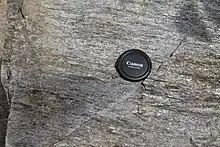schist
English

Schist
Etymology
From French schiste, from Latin schistos lapis (“the stone that is easy to split”), from Ancient Greek σχίζω (skhízō, “I split”).
Pronunciation
IPA(key): /ʃɪst/
Noun
schist (countable and uncountable, plural schists)
- Any of a variety of coarse-grained crystalline metamorphic rocks with a foliated structure that allows easy division into slabs or slates.
- 1890, George Huntington Williams, The Greenstone Schist Areas of the Menominee and Marquette Regions of Michigan, US Geological Survey, Number 62, page 74,
- Although it shows under the microscope traces of the original gabbro structure and of the original gabbro minerals, no one would hesitate from a microscopical examination to class it with the schists.
- 1915, Charles Will Wright, Geology and Ore Deposits of Copper Mountain and Kasaan Peninsula, Alaska, US Geological Survey, Professional Paper 87, page 29,
- Narrow bands of schist are interstratified with these limestones, and in turn narrow beds of limestone are interstratified with the schists.
- 2012, Amy Schoeman, Skeleton Coast, page ii
- Millions of years ago the mica schists surrounding the old Brandberg West Mine became folded and concertinaed by enormous horizontal pressures.
- 1890, George Huntington Williams, The Greenstone Schist Areas of the Menominee and Marquette Regions of Michigan, US Geological Survey, Number 62, page 74,
Derived terms
Related terms
Translations
crystalline foliated rock
See also
Dutch
Etymology
From French schiste, from Latin schistos lapis (“the stone that is easy to split”), from Ancient Greek σχυζειν (skhuzein, “to split”).
Pronunciation
Audio (file)
Derived terms
- schisteus
This article is issued from Wiktionary. The text is licensed under Creative Commons - Attribution - Sharealike. Additional terms may apply for the media files.